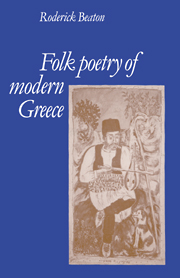Book contents
- Frontmatter
- Contents
- Preface
- Maps
- 1 INTRODUCTION
- 2 THE DEMOTIC TRADITION: THE SONGS
- 3 STRUCTURE OF THE DEMOTIC TRADITION: THE FORMULA
- 4 STRUCTURE OF THE DEMOTIC TRADITION: IMAGERY AND THEMES
- 5 THE EMERGENCE OF THE DEMOTIC TRADITION
- 6 FUNCTION OF THE DEMOTIC TRADITION: THE SONGS AND HISTORY
- 7 THE SONGS AS MYTH
- 8 ONE TRADITION OR SEVERAL?
- 9 THE HISTORICAL TRADITION
- 10 GREEK FOLK POETRY AND WRITING
- Notes
- Glossary of Greek words transliterated in the text
- Bibliography
- Index
10 - GREEK FOLK POETRY AND WRITING
Published online by Cambridge University Press: 13 September 2009
- Frontmatter
- Contents
- Preface
- Maps
- 1 INTRODUCTION
- 2 THE DEMOTIC TRADITION: THE SONGS
- 3 STRUCTURE OF THE DEMOTIC TRADITION: THE FORMULA
- 4 STRUCTURE OF THE DEMOTIC TRADITION: IMAGERY AND THEMES
- 5 THE EMERGENCE OF THE DEMOTIC TRADITION
- 6 FUNCTION OF THE DEMOTIC TRADITION: THE SONGS AND HISTORY
- 7 THE SONGS AS MYTH
- 8 ONE TRADITION OR SEVERAL?
- 9 THE HISTORICAL TRADITION
- 10 GREEK FOLK POETRY AND WRITING
- Notes
- Glossary of Greek words transliterated in the text
- Bibliography
- Index
Summary
WRITING AND ORAL TRADITION
There was never ane o'ma songs prentit till ye prentit them yoursel’ and ye hae spoilt them a' thegither. They were made for singing and no for reading, but ye hae broken the charm now and they'll never be sung mair. And the warst thing o' a', they're nouther right spell'd, nor right setten down. (Hogg, quoted in Wells, 1950, p. 249)
With these words James Hogg's mother, one of the sources on whom Walter Scott had drawn for his Minstrelsy of the Scottish border, dismissed the publication and the well-meaning attempt to preserve oral folk poetry in print. The charge levelled against Scott appears confirmed by subsequent history, to the extent that it is now almost a commonplace that literacy is incompatible with a healthy oral tradition.
In Greece, as elsewhere in Europe, there has been a gradual breakdown of traditional oral poetry, beginning, so far as one can tell, about the time that songs began to be collected and distributed to a reading rather than to a listening public. It seems now to be widely believed that the growth of literacy during this period is predominantly responsible, and in the study of other folk cultures the idea has recently been refined.
- Type
- Chapter
- Information
- Folk Poetry of Modern Greece , pp. 179 - 202Publisher: Cambridge University PressPrint publication year: 1980

